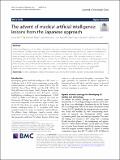The advent of medical artificial intelligence: lessons from the Japanese approach
Author(s)
Ishii, Euma; Ebner, Daniel K; Kimura, Satoshi; Agha-Mir-Salim, Louis; Uchimido, Ryo; Celi, Leo Anthony G.; ... Show more Show less
Download40560_2020_Article_452.pdf (666.6Kb)
Publisher with Creative Commons License
Publisher with Creative Commons License
Creative Commons Attribution
Terms of use
Metadata
Show full item recordAbstract
Artificial intelligence or AI has been heralded as the most transformative technology in healthcare, including critical care medicine. Globally, healthcare specialists and health ministries are being pressured to create and implement a roadmap to incorporate applications of AI into care delivery. To date, the majority of Japan’s approach to AI has been anchored in industry, and the challenges that have occurred therein offer important lessons for nations developing new AI strategies. Notably, the demand for an AI-literate workforce has outpaced training programs and knowledge. This is particularly observable within medicine, where clinicians may be unfamiliar with the technology. National policy and private sector involvement have shown promise in developing both workforce and AI applications in healthcare. In combination with Japan’s unique national healthcare system and aggregable healthcare and socioeconomic data, Japan has a rich opportunity to lead in the field of medical AI.
Date issued
2020-05-18Department
Massachusetts Institute of Technology. Institute for Medical Engineering & ScienceJournal
Journal of Intensive Care
Publisher
BioMed Central
Citation
Ishii, Euma et al. "The advent of medical artificial intelligence: lessons from the Japanese approach." Journal of Intensive Care 8 (May 2020): 35 ©2020 Author(s)
Version: Final published version
ISSN
2052-0492